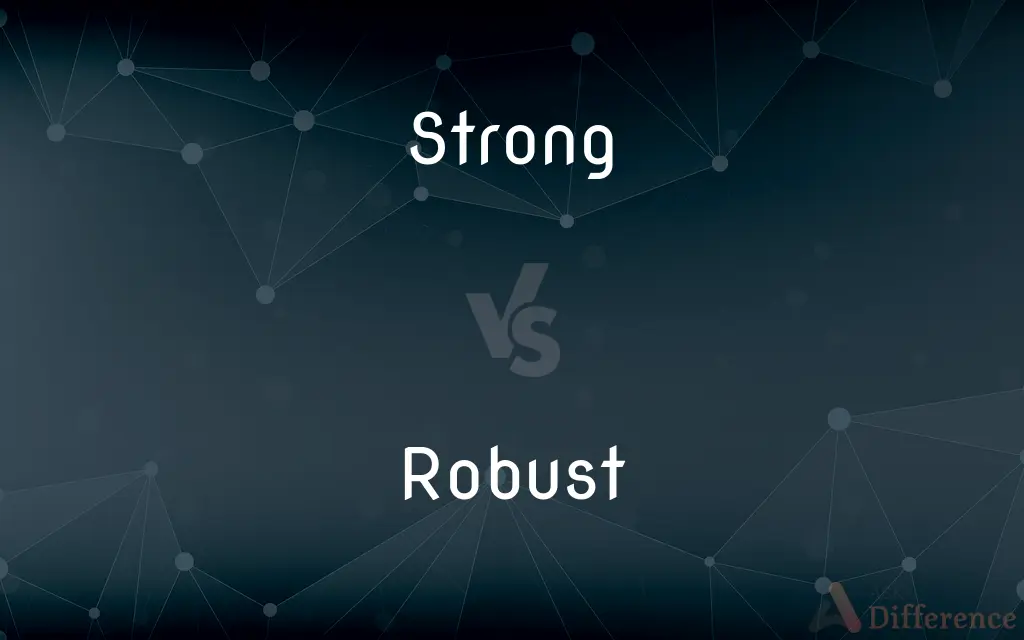Strong vs. Robust — What's the Difference?
By Tayyaba Rehman & Maham Liaqat — Updated on April 24, 2024
Strong refers to having great physical power or force, whereas robust indicates durability and the ability to withstand stress or adverse conditions.

Difference Between Strong and Robust
Table of Contents
ADVERTISEMENT
Key Differences
Strong primarily describes physical power or strength, such as in muscles or materials. Whereas, robust extends to broader qualities including structural integrity and resilience against external pressures.
Strong is often used to describe athletes or structures designed to handle heavy loads. On the other hand, robust is frequently used in contexts like economics or technology to denote systems that endure stress without breaking down.
Strength can be temporary or situational, focusing on the immediate capacity to exert force. In contrast, robustness implies a long-lasting and reliable strength that resists wear, failure, or volatility.
Strong can also imply effectiveness in achieving an impact, such as a strong flavor or a strong argument. Meanwhile, robust often connotes thoroughness and an ability to maintain functionality under a wide range of conditions.
Strong and robust both enhance descriptions, but their usage depends greatly on the context—strong for immediate, impactful power; robust for enduring, reliable strength.
ADVERTISEMENT
Comparison Chart
Primary Context
Physical power and force
Durability and stress resistance
Typical Usage
Athletes, materials, arguments
Systems, economies, technologies
Focus on
Immediate capacity to exert force
Long-lasting, reliable performance
Implication of Duration
Can be temporary
Implies longer-term reliability
Associated Characteristics
Might involve quick impact or influence
Involves thoroughness, broad functionality
Compare with Definitions
Strong
Powerful in force.
The strong winds toppled trees.
Robust
Able to withstand or overcome adverse conditions.
The robust species survived the harsh winter.
Strong
Capable of withstanding great pressure.
The bridge is strong enough to handle heavy traffic.
Robust
Strongly formed or constructed.
A robust design makes the device durable.
Strong
Intense or potent in degree.
She has a strong preference for classical music.
Robust
Rich and full-flavored.
The robust sauce complements the pasta perfectly.
Strong
Convincing or persuasive.
He made a strong case for his promotion.
Robust
Strong and healthy.
A robust young athlete excels at sports.
Strong
Rich in particular nutrients.
This is a strong brew of coffee.
Robust
Thorough and detailed.
The research paper was robust in its analysis.
Strong
Having the power to move heavy weights or perform other physically demanding tasks
She cut through the water with her strong arms
Robust
Full of health and strength; vigorous.
Strong
Able to withstand force, pressure, or wear
Cotton is strong, hard-wearing, and easy to handle
Robust
Powerfully built; sturdy
A robust body.
Strong
Very intense
A strong smell
Robust
Requiring or characterized by much strength or energy
A robust workout.
Strong
Used after a number to indicate the size of a group
A hostile crowd several thousands strong
Robust
Active or dynamic
A robust debate.
A robust economy.
Strong
Denoting a class of verbs in Germanic languages that form the past tense and past participle by a change of vowel within the stem rather than by addition of a suffix (e.g. swim, swam, swum).
Robust
Working in an effective way; effective or productive
A robust search engine.
A robust hypothesis.
Strong
Relating to or denoting the strongest of the known kinds of force between particles, which acts between nucleons and other hadrons when closer than about 10⁻¹³ cm (so binding protons in a nucleus despite the repulsion due to their charge), and which conserves strangeness, parity, and isospin.
Robust
Marked by richness and fullness; full-bodied
A robust wine.
Strong
Physically powerful; capable of exerting great physical force.
Robust
Substantial in amount
Robust gains in stock prices.
Strong
Marked by great physical power
A strong blow to the head.
Robust
Rough or crude; coarse
A robust tale.
Strong
In good or sound health; robust
A strong constitution.
A strong heart.
Robust
Evincing strength and health; strong; often, especially both large and healthy#Adjective.
He was a robust man of six feet four.
Robust health
A robust wall was put up.
Strong
Economically or financially sound or thriving
A strong economy.
Robust
Violent; rough; rude.
Strong
Having force of character, will, morality, or intelligence
A strong personality.
Robust
Requiring strength or vigor.
Robust employment
Strong
Having or showing ability or achievement in a specified field
Students who are strong in chemistry.
Robust
Sensible (of intellect etc.); straightforward, not given to or confused by uncertainty or subtlety.
Strong
Capable of the effective exercise of authority
A strong leader.
Robust
(systems engineering) Designed or evolved in such a way as to be resistant to total failure despite partial damage.
Strong
Capable of withstanding force or wear; solid, tough, or firm
A strong building.
A strong fabric.
Robust
(software engineering) Resistant or impervious to failure regardless of user input or unexpected conditions.
Strong
Having great binding strength
A strong adhesive.
Robust
(statistics) Not greatly influenced by errors in assumptions about the distribution of sample errors.
Strong
Not easily captured or defeated
A strong flank.
A strong defense.
Robust
Of an individual or skeletal element: strongly built; muscular; not gracile.
Strong
Not easily upset; resistant to harmful or unpleasant influences
Strong nerves.
A strong stomach.
Robust
Evincing strength; indicating vigorous health; strong; sinewy; muscular; vigorous; sound; as, a robust body; robust youth; robust health.
Strong
Having force or rapidity of motion
A strong current.
Robust
Violent; rough; rude.
While romp-loving missIs hauled about in gallantry robust.
Strong
Persuasive, effective, and cogent
A strong argument.
Robust
Requiring strength or vigor; as, robust employment.
Then 'gan the villain wax so fierce and strong,That nothing may sustain his furious force.
Strong
Forceful and pointed; emphatic
A strong statement.
Robust
Physically strong
Strong
Forthright and explicit, often offensively so
Strong language.
Robust
Marked by richness and fullness of flavor;
A rich ruby port
Full-bodied wines
A robust claret
The robust flavor of fresh-brewed coffee
Strong
Extreme; drastic
Had to resort to strong measures.
Robust
Strong enough to withstand intellectual challenge;
The experiment yielded robust results
A robust faith
Strong
Having force of conviction or feeling; uncompromising
Strong faith.
A strong supporter.
Robust
Rough and crude;
A robust tale
Strong
Intense in degree or quality
A strong emotion.
Strong motivation.
Strong
Having an intense or offensive effect on the senses
Strong light.
Strong vinegar.
Strong cologne.
Strong
Clear and loud
A strong voice.
Strong
Readily noticeable; remarkable
A strong resemblance.
A strong contrast.
Strong
Readily detected or received
A strong radio signal.
Strong
Having a high concentration of an essential or active ingredient
Mixed a strong solution of bleach and water.
Strong
Containing a considerable percentage of alcohol
Strong punch.
Strong
Powerfully effective
A strong painkiller.
Strong
Of or relating to a color having a high degree of saturation.
Strong
Having a specified number of units or members
A military force 100,000 strong.
Strong
Marked by steady or rising prices
A strong market.
Strong
Of or relating to those verbs in Germanic languages that form their past tense by a change in stem vowel, and their past participles by a change in stem vowel and sometimes by adding the suffix -(e)n, as sing, sang, sung or tear, tore, torn.
Strong
Of or relating to the inflection of nouns or adjectives in Germanic languages with endings that historically did not contain a suffix with an n.
Strong
Stressed or accented in pronunciation or poetic meter. Used of a word or syllable.
Strong
In a strong, powerful, or vigorous manner; forcefully
A salesperson who comes on too strong.
Strong
Capable of producing great physical force.
A big strong man; Jake was tall and strong
Strong
Capable of withstanding great physical force.
A strong foundation; good strong shoes
Strong
(of water, wind, etc.) Having a lot of power.
The man was nearly drowned after a strong undercurrent swept him out to sea.
Strong
Determined; unyielding.
He is strong in the face of adversity.
Strong
Highly stimulating to the senses.
A strong light; a strong taste
Strong
Having an offensive or intense odor or flavor.
A strong smell
Strong
Having a high concentration of an essential or active ingredient.
A strong cup of coffee; a strong medicine
Strong
(specifically) Having a high alcoholic content.
A strong drink
She gets up, and pours herself a strong one. - Eagles, Lying Eyes
Strong
(grammar) Inflecting in a different manner than the one called weak, such as Germanic verbs which change vowels.
A strong verb
Strong
(chemistry) That completely ionizes into anions and cations in a solution.
A strong acid;
A strong base
Strong
(military) Not easily subdued or taken.
A strong position
Strong
Having wealth or resources.
A strong economy
Strong
Impressive, good.
You're working with troubled youth in your off time? That’s strong!
Strong
Having a specified number of people or units.
The enemy's army force was five thousand strong.
Strong
(of a disease or symptom) Severe; very bad or intense.
Strong
Having a wide range of logical consequences; widely applicable. (Often contrasted with a weak statement which it implies.)
Strong
(of an argument) Convincing.
Strong
In a strong manner.
Strong
Having active physical power, or great physical power to act; having a power of exerting great bodily force; vigorous.
That our oxen may be strong to labor.
Orses the strong to greater strength must yield.
Strong
Having passive physical power; having ability to bear or endure; firm; hale; sound; robust; as, a strong constitution; strong health.
Strong
Solid; tough; not easily broken or injured; able to withstand violence; able to sustain attacks; not easily subdued or taken; as, a strong beam; a strong rock; a strong fortress or town.
Strong
Having great military or naval force; powerful; as, a strong army or fleet; a nation strong at sea.
Strong
Having great wealth, means, or resources; as, a strong house, or company of merchants.
Strong
Reaching a certain degree or limit in respect to strength or numbers; as, an army ten thousand strong.
Strong
Moving with rapidity or force; violent; forcible; impetuous; as, a strong current of water or wind; the wind was strong from the northeast; a strong tide.
Strong
Adapted to make a deep or effectual impression on the mind or imagination; striking or superior of the kind; powerful; forcible; cogent; as, a strong argument; strong reasons; strong evidence; a strong example; strong language.
Strong
Ardent; eager; zealous; earnestly engaged; as, a strong partisan; a strong Whig or Tory.
Her mother, ever strong against that match.
Strong
Having virtues of great efficacy; or, having a particular quality in a great degree; as, a strong powder or tincture; a strong decoction; strong tea or coffee.
Strong
Full of spirit; containing a large proportion of alcohol; intoxicating; as, strong liquors.
Strong
Affecting any sense powerfully; as, strong light, colors, etc.; a strong flavor of onions; a strong scent.
Strong
Solid; nourishing; as, strong meat.
Strong
Well established; firm; not easily overthrown or altered; as, a strong custom; a strong belief.
Strong
Violent; vehement; earnest; ardent.
He had offered up prayers and supplications with strong crying and tears.
Strong
Having great force, vigor, power, or the like, as the mind, intellect, or any faculty; as, a man of a strong mind, memory, judgment, or imagination.
I was stronger in prophecy than in criticism.
Strong
Vigorous; effective; forcible; powerful.
Like her sweet voice is thy harmonious song,As high, as sweet, as easy, and as strong.
Strong
Tending to higher prices; rising; as, a strong market.
Strong
Pertaining to, or designating, a verb which forms its preterit (imperfect) by a variation in the root vowel, and the past participle (usually) by the addition of -en (with or without a change of the root vowel); as in the verbs strive, strove, striven; break, broke, broken; drink, drank, drunk. Opposed to weak, or regular. See Weak.
Strong
Having strength or power greater than average or expected;
A strong radio signal
Strong medicine
A strong man
Strong
Used of syllables or musical beats
Strong
Not faint or feeble;
A strong odor of burning rubber
Strong
Having or wielding force or authority;
Providing the ground soldier with increasingly potent weapons
Strong
Having a strong physiological or chemical effect;
A potent toxin
Potent liquor
A potent cup of tea
Strong
Able to withstand attack;
An impregnable fortress
Fortifications that made the frontier inviolable
Strong
Of good quality and condition; solidly built;
A solid foundation
Several substantial timber buildings
Strong
Of verbs not having standard (or regular) inflection;
`sing' is a strong verb
Strong
Having a high alcoholic content;
Hard liquor
Strong
Freshly made or left;
A warm trail
The scent is warm
Strong
Strong and sure;
A firm grasp
Gave a strong pull on the rope
Common Curiosities
Can a person be both strong and robust?
Yes, a person can be both strong and robust, meaning they possess physical strength and are durable against illnesses or fatigue.
What does robust mean in a practical sense?
In practical terms, robust refers to an object or system's ability to endure stress and adverse conditions without breaking down.
What makes something strong?
Something is considered strong if it possesses a lot of physical power or force, or if it is capable of withstanding physical pressure or damage.
Is it better to be strong or robust in business?
In business, being robust is often more advantageous as it implies being able to withstand market volatility and operational stresses better than just being strong in one area.
How do you determine if a material is strong or robust?
A material's strength is measured by its ability to withstand forces like tension or compression, while its robustness is measured by its durability and long-term performance under various conditions.
In terms of leadership, how do strong and robust differ?
Strong leadership often implies assertive and decisive action, whereas robust leadership might involve adaptable and resilient strategies that withstand various challenges.
What is the relationship between robust health and strong health?
Robust health implies overall well-being and the ability to recover quickly from illness, while strong health typically focuses on physical strength and vitality.
What is the significance of a strong flavor versus a robust flavor?
A strong flavor is intensely potent, often overwhelming other flavors, whereas a robust flavor is full-bodied and rich, enhancing the overall complexity of a dish.
How do you increase the robustness of a system?
Increasing a system's robustness typically involves improving its tolerance to different operating conditions, enhancing error handling, and making it more adaptable to changes.
Is a strong economy the same as a robust economy?
A strong economy typically shows high growth rates and productivity, whereas a robust economy is characterized by stability, resilience to economic shocks, and sustainable growth.
Is a strong password the same as a robust password?
A strong password typically refers to having a high level of security due to complexity and length, whereas a robust password is effective across different security environments and resistant to various hacking attempts.
What is the primary difference between strong and robust in engineering?
In engineering, "strong" refers to the ability to withstand forces without breaking, while "robust" refers to the ability to perform well across a variety of conditions and resist failure under different stresses.
Can animals be described as robust?
Yes, animals can be described as robust if they are hardy, can survive in harsh conditions, or are less prone to diseases.
Can software be described as robust?
Yes, software can be described as robust if it continues to operate effectively despite errors, poor inputs, or unexpected usage scenarios.
How does one describe a robust argument compared to a strong argument?
A robust argument is comprehensive and well-supported by evidence, making it resistant to counterarguments, whereas a strong argument is compelling and persuasive but not necessarily comprehensive.
Share Your Discovery

Previous Comparison
Liaise vs. Collaborate
Next Comparison
Use vs. ConsumeAuthor Spotlight
Written by
Tayyaba RehmanTayyaba Rehman is a distinguished writer, currently serving as a primary contributor to askdifference.com. As a researcher in semantics and etymology, Tayyaba's passion for the complexity of languages and their distinctions has found a perfect home on the platform. Tayyaba delves into the intricacies of language, distinguishing between commonly confused words and phrases, thereby providing clarity for readers worldwide.
Co-written by
Maham Liaqat















































